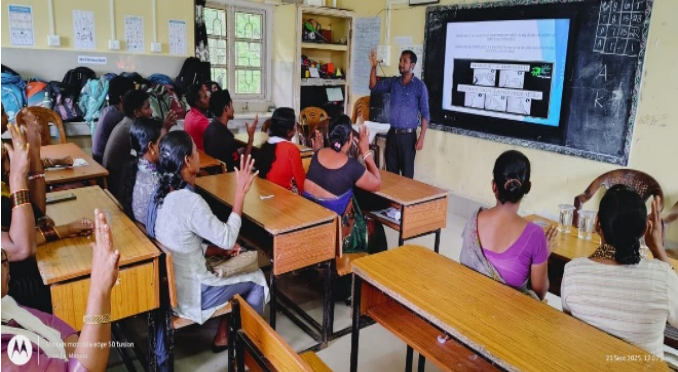The International Sign Language Day was observed in Diglipur with a workshop and awareness programme organized by the Block Project Office at GSS Durgapur. The event was held under the theme “No Human Right without Sign Language Rights” and brought together teachers, parents, and students to underline the importance of inclusivity in communication and education.
The observance was part of global efforts to highlight sign language as an essential element of human rights. In a district that continues to face challenges in providing accessible education for all, the workshop provided a rare opportunity for participants to engage directly with the principles of equal communication.
Teachers attending the programme were introduced to the basics of sign language, emphasizing its importance in creating inclusive classrooms. By equipping educators with awareness about the language, the initiative seeks to pave the way for improved learning environments where students with hearing disabilities are not left behind. The training also drew attention to the fact that inclusivity in education is not limited to infrastructure but requires deliberate communication tools and methods.
Parents, too, were central to the session. Many of them interacted with facilitators to better understand how to support children with hearing impairments. In areas like Diglipur, where access to special resources is limited, parental awareness can make a decisive difference in enabling children to engage meaningfully in both school and community life.
For students, the event was equally impactful. Young participants learned about sign language not just as a tool for the hearing impaired, but as a medium that represents equality, dignity, and mutual respect. Exposure to these ideas at an early age is considered a step toward reducing stigma and fostering peer support in classrooms.
The theme “No Human Right without Sign Language Rights” was brought to life through discussions and demonstrations. Organizers explained that the recognition of sign language is not simply about communication, but about ensuring that people with hearing impairments can fully exercise their rights, from education and employment to participation in public life. Without sign language, access to these rights remains incomplete.
The workshop also served to remind stakeholders of the commitments made under international conventions and national policies on inclusive education.The observation of International Sign Language Day in Diglipur adds to a growing list of community-level initiatives across the Islands that are broadening the understanding of education. By placing sign language at the center of the conversation, the event has reinforced the idea that communication is a bridge to empowerment, not a barrier.
As teachers return to their classrooms, parents to their families, and students to their peers, the lessons from the day are expected to resonate in daily interactions. While the road to full inclusion remains long, the workshop in Diglipur marks a meaningful step in ensuring that every voice, spoken or signed, has a place in the community.







